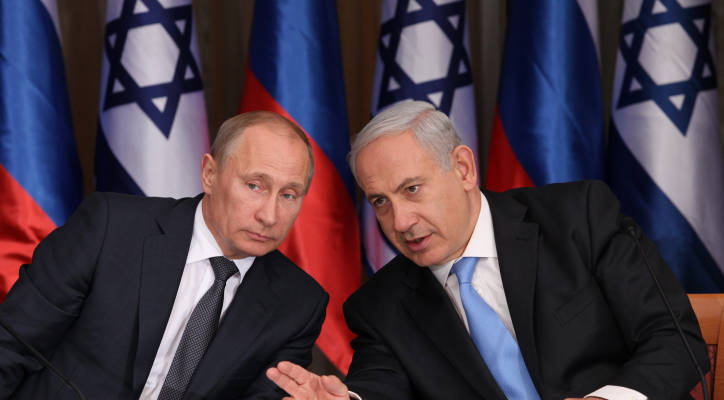The Israeli leader also strongly criticized the Kremlin’s ‘dangerous’ cooperation with the Iranian regime.
By JNS
Prime Minister Benjamin Netanyahu had a tense phone conversation with President Vladimir Putin on Sunday, the Israeli leader’s office confirmed, amid mounting tensions between Moscow and Jerusalem.
During the phone call, Netanyahu expressed “dismay” about the recent anti-Israel positions taken by Russian representatives at the U.N. and other international fora, according to the Prime Minister’s Office.
Netanyahu said he emphasized that “any country that would suffer a criminal terrorist attack such as Israel experienced would act with no less force than the one with which Israel operates.”
The Israeli leader also strongly criticized the Kremlin’s “dangerous” cooperation with the Iranian regime.
Netanyahu thanked Putin for his successful efforts to free Israeli citizens with dual Russian citizenship held by Hamas in the Gaza Strip, adding that the Jewish state would use “all means, both political and military,” to free the roughly 135 hostages who remain in captivity.
The premier requested that Moscow put pressure on the International Committee of the Red Cross to visit the remaining hostages and provide them with medicine.
According to Russia’s state-run TASS news agency, the leaders’ conversation focused on the “catastrophic humanitarian situation” in Gaza, with Putin saying that Israel’s military response to Hamas’s Oct. 7 attack cannot lead “to such dire consequences” for Palestinian civilians.
The Russian readout added that Moscow is “ready to provide all possible assistance in order to alleviate the suffering of civilians and de-escalate the conflict” and that the two countries are seeking to continue their cooperation in freeing hostages and evacuating citizens from the Strip.
On Oct. 25, Russia vetoed a U.S.-sponsored U.N. Security Council resolution condemning Hamas for its Oct. 7 rampage in the northwestern Negev in which terrorists murdered more than 1,200 persons.
The next day, Israel condemned Russia after it hosted a delegation of Hamas terrorists in Moscow, calling it “an act of support of terrorism.”
The ambassador of Russia to the United Nations has also told a General Assembly special session on the current war that Israel does not have the right to defend itself.
In response, the IDF has stopped warning Russian forces in Syria ahead of every airstrike it carries out in the country, Bloomberg reported last month, citing “people familiar with the situation.”
According to Bloomberg, the Israel Defense Forces did not warn Russia ahead of an Oct. 30 strike on a military base in Daraa in southwestern Syria. Similarly, no notice was given when Israeli jets attacked a Syrian base housing Hezbollah terrorists five days earlier.
